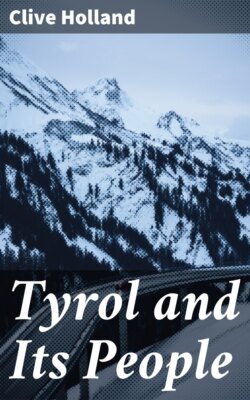Читать книгу Tyrol and Its People - Clive Holland - Страница 10
На сайте Литреса книга снята с продажи.
CHAPTER III
ОглавлениеTable of Contents
SOME CHARACTERISTIC LEGENDS, CUSTOMS, AND SPORTS
Just as is the case with Switzerland so in Tyrol the land itself, its history, even its geological evolution, seem in a measure reflected in the character and disposition of its people. One cannot indeed be any long time in Tyrol without becoming aware of and appreciating this fact. In the kindliness and hospitality of the Tyrolese one has reflected the characteristics of aloofness from the outer world, and dependence upon one another, which the position of their "land within the mountains" typifies—characteristics which have grown (and fortunately have not yet become, at least in the more remote parts, to any large extent tainted by considerations of self-interest) from the circumstances of former days, when individual hospitality had to serve for the absence of inns and commercial conveniences of the kind. So, too, in the rugged, patriotic, and sturdy natures of the people one can trace a parallel with the configuration of their beloved land; as one can also trace in their single-heartedness, piety, poetic traits, and simplicity, the frugal and laborious lives which the majority lead, unvexed in former times by the fret of small things, and through succeeding ages strengthened by the great needs of patriotism and self-sacrifice which the political crises outside their own borders often brought home to them by invasion and attempted subjection.
A DELIGHTFUL LAND
It is not at all wonderful, then, that a people dwelling in a land of such surpassing beauty, where flower-bedecked upper pastures melt away into rocky peaks, glaciers, and snow-clad heights; where the music of tinkling brooks trickling down the mountain side and the roar of greater torrents are ever with them; with the eternal silence of great heights surrounding them and, as it were, shutting them in from the outer world, should be gifted with an appreciation of romantic beauty, legend, and poetry beyond the common run of mortals.
As we have already shown, much history and many stirring events have been enacted within the mountain-girdled borders of Tyrol. And, nowadays, when the country is coming slowly but surely to her own as a delightful holiday ground for weary dwellers in Western cities, many of her valleys bring to the minds of those who know something of the country's story dramatic and romantic memories of the stirring events and legends which have through past ages become associated with their names.
Scarcely a valley, village, or townlet, whether set high or low in this enticing land, but has its own legend or story. And in almost all of the less travelled corners one finds strange, and to most travellers incomprehensible, dialects still lingering amongst the peasantry, notwithstanding the fact that gradually the Germanization of even the southern portion of Tyrol is being brought about. In one or other of these dialects which so survive, scholars and philologists of former times have thought the key to the ancient language of Etruria might be discovered; and in more modern days there has been the same hope expressed, but as yet it is unfulfilled. Müller,[7] for one, thought that in some secluded valley of the Tyrol or Grisons the key to the riddle in the form of "a remnant of the old Rhætian dialect might be discovered." Müller's hope has since then in a measure been realized through the efforts and researches of Steub, who, whilst travelling in Tyrol in Alpine districts in 1842, found some fragmentary remains of a dialect approaching very nearly Etruscan, though not sufficiently full to form any very important or extended key to the tongue. His book[8] contains the results of the inquiries, tests, and deductions which he was at first led to undertake by the strange names of the towns and villages which he came across in his travels. Then he collected these, and we are told set to work "testing them with Celtic, but discovering no analogy he tried other tests, and with the Etruscan met with some considerable success," which was chiefly valuable, however, as confirming the theory and ancient traditions of a Rhæto-Etruria. Many of his conclusions, however, have never been accepted by philologists either of his own day or of later times; and some of the word examples he gives as having analogies are quite incomprehensible to the ordinary student.
THE LANGUAGE
To all intents and purposes German and Italian are the languages spoken throughout Tyrol, a knowledge of which will be sufficient for all ordinary purposes of travel. The former prevailing in the Vorarlberg and North Tyrol; the latter in South Tyrol and Wälsch Tyrol, though German is found in both of these districts, and in South Tyrol very considerably.
In the Vorarlberg, however, one comes across numerous words and expressions which are undoubtedly of Italian origin, and are remaining evidences of the periods when the Venetian Republic ruled over a district now a part of Tyrol. The Italian word gútto, a can or feeding-bottle, for example, has its counterpart in guttera; whilst from fazzolétto, a handkerchief, one has fazanedle; and from gaudio, joy, we have gaude; and from cappéllo, a hat, has probably come schapel.
